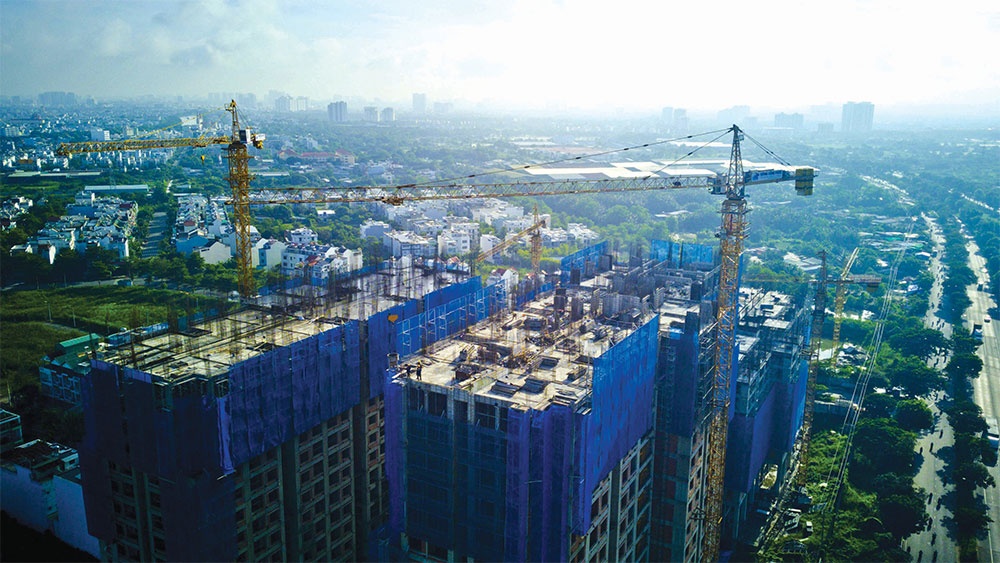Law on Land amendments to usher in positive changes
Land-related issues have been always complex and sensitive, but significant to the stability and sustainable development of the country. Resolution No.18-NQ/TW, issued in June 2022, sets new goals and requirements for national development in the coming period, requiring a drastic and fundamental reform of land management and use, especially land -related regulations, with the aim of easing current obstacles and laying a firm foundation for Vietnam to grow into a high-income developed country by 2045.
 |
| Law on Land amendments to usher in positive changes |
The Law on Land amendments should also be approved by the National Assembly (NA) in 2023 to ease obstacles caused from the current law, as well as navigate a new phase of expansion in the Vietnamese real estate market.
In recent years, more than 70 per cent of the lawsuits and legal cases brought to trial have been closely linked to land conflicts. Between 2013 and 2020, government agencies at all levels received over 324,000 legal complaints related to land, representing 63 per cent of the total.
Shortcomings arising from land-related regulations and land management and use have led to the loss of state budget revenues, while legitimate interests and livelihoods of local people have been affected.
The real estate market, including the land use right market, has not developed as expected, with many potential risks and the lack of transparency and sustainability, while the market for agricultural land use rights remains underdeveloped. All the aforementioned issues have been criticised repeatedly at recent NA sessions.
After four postponements, the draft amended Law on Land was submitted in November 2022. The draft law includes 16 chapters with 245 articles, of which 28 articles remain unchanged. As many as 184 articles would be amended and supplemented, while there would be 41 new articles added to the draft and eight articles abolished.
Significant regulations mentioned in the draft law are expected to leverage the real estate market. They include the renewal of financial mechanisms and policies, land prices while regulating the relationship among the state, market, and society. The draft law also removes regulations on the government’s land price bracket which has been adjusted every five years, while specifying the principles of land pricing in accordance with market values and having the land price list established annually.
For the areas with digital cadastral map and land price database, the land price list will be built in line with value zone and standard land plot. The draft law also points out which cases are eligible to the land price brackets, which would be used to calculate income tax on land use right transactions.
Furthermore, the draft law adds a chapter on land fund development for the purpose of creating land to actively regulate supply and demand as well as the auctions of land use rights to promote land resources.
It looks to develop a healthy and stable land use right market through financial instruments and additional tax policies dedicated to projects that are behind schedule and do not put land into use. It also aims to regulate transactions on land use rights for projects performed on trading floors, and ask for the compulsory registration of land prices and properties attached to land.
Two-price loophole
The draft law is expected to lead to strong renewal of land policy and underpin expectations for the stability and transparency of the Vietnamese real estate market that has also exhibited a number of unusual fluctuations in recent years.
Tran Van Khai, delegate from Ha Nam province and a Standing Member of the NA Science and Technology Committee, noted that many land-use right holders, subject to land acquisition, assumed that the draft law would enable the compensation and support to be agreed at a price close to the market level, so they are waiting for the law to be approved by the NA and do not comply acquisition land decisions.
“This matter has hindered the implementation of commercial real estate projects as well as the disbursement of public investment as scheduled, thus causing considerable bottlenecks for economic growth,” Khai said.
Dr. Le Dinh Vinh, director of Vietthink Law Firm, said that inadequacies in the current Law on Land, coupled with the contradictions and overlaps between the current law and investment-related laws, have also been causing a bottleneck for business and investment activities at large.
“Many local officials said they are confused over legal documents related to land issues because they do not know whether they are right or wrong, so they tend to wait for the revised law. And when the local authorities wait for the law, businesses come to a standstill,” Vinh said.
The fourth session of the 15th NA spent its first plenary discussion on the draft amended Law on Land in the presence of permanent members of people’s councils and committees of 55 cities and provinces across the country.
At the plenary discussion, NA delegates, including those who have directly dealt with many complicated land cases, raised concerns about the bottlenecks regarding two types of land prices. One price is regulated by the state for compensation and site clearance, while the other is agreed upon by the project developer and land-use right holders.
Meanwhile, in institutionalising Resolution 18, the draft law strives to stipulate more clearly conditions for land acquisition for national defence and security purposes, and socioeconomic development. The draft law continues to push up the implementation of the self-negotiation mechanism between land-use right holders and developers in commercial housing projects.
“The self-negotiation mechanism has created absurdities and social injustice, especially when the price of land plots acquired for projects of national interest can be 100 times lower than the level agreed via self-negotiation mechanisms,” said NA deputy Pham Van Thinh, head of Bac Giang Party Committee’s Mass Mobilisation Department.
Meanwhile, Dao Hong Van, Secretary of the Party Committee of Van Giang district in Hung Yen province and Chairman of Van Giang People’s Council, claimed that it is hard to implement the self-negotiation mechanism for projects in the district.
“This has caused great damage to project developers as they have spent a large amount of money making compensations for land-use right holders but could not accelerate their projects,” Van said.
It is attributed to the fact that some land-use right holders are asking for a high agreed price for their acquired land, even many times higher than the compensation level they agreed earlier. If the project developer accepts the proposed compensation, it will cause different levels of compensation for the same land plot, thereby causing conflicts among land-use right holders.
Additionally, Van underlined that for urban development and commercial housing projects, investors are selected by the direct auction or bidding of non-residential land. “Thus, of course, the state must ensure site clearance and clean ground for auction – however, it is still hard to implement the self-negotiation mechanism,” Van said.
Nguyen Van Hien, director of the Institute for Legislative Studies under the NA Standing Committee, asserted that the unfair situation in land acquisition is caused by the current Law on Land, the issue will be improved thanks to the revised law.
“Accordingly, land prices would be built into more market-based ones. Once land prices move close to the market levels, there would be no major difference in the prices of land recovered for the purpose of national defence and security or national interest and those for commercial and residential purposes,” Hien said.
Nevertheless, how to determine market-based prices remains the hardest question. To answer it, database of land prices in different regions should be built, but it takes time. Hien suggested that determining market-based land prices should be the most important issue to untangle the knot of land acquisition.
Valuation and consistency
How to bring land prices close to market levels is still a controversial issue since the draft law was released for public comment.
Dang Hung Vo, former Deputy Minister of Natural Resources and Environment, NA deputy Hoang Van Cuong, Minister of Natural Resources and Environment Tran Hong Ha, and other experts all stated the determination that more market-based land prices are possible.
Land valuation is the root cause of all problems Tran Hong Ha, Minister of Natural Resources and Environment Land valuation is the crux of land-related issues. There are now five methods of valuing land, but the land price is still away from the market, possibly due to incorrect valuation of input elements. In the long run, full collection of land price data is the only method to bring land prices closer to the market. Once there is enough data on market prices and a benchmark to determine land plots, the current inadequacies related to determining land prices would be dealt with. |
Thach Phuoc Binh, an NA deputy from Tra Vinh province, said that the 2013 Law on Land indicated a failure of setting forth land price brackets in nearly a decade as the land price lists determined by the municipal and provincial-level people’s committees have always been much lower than the market prices while disputes and complaints about land acquisition and compensation have been on the rise.
“However, in the light of the draft law, land prices would be specified by the municipal and provincial people’s committees. Meanwhile, other regulations, including the allocation, leasing, and recognising land-use rights, changing land-use purposes, and acquiring land, remain unchanged in comparison with the current law,” Binh said.
Indeed, the draft law does not include any effective mechanism to improve the quality of land valuation, ensure the independence of land price appraisal councils as well as the capacity and professional ethics of consulting organisations, in accordance with Resolution 18. Binh called for an independent agency established by municipal and provincial people’s committees to determine land prices.
Other NA deputies urged for redesigning regulations on land financing so that determining market-based land prices would be feasible when the revised law takes effect.
In order to leverage the real estate market, finalisation of the draft law must be mulled over in line with other laws to ensure uniformity. Hoang Thanh Tung, Chairman of the NA Committee for Legal Affairs, warned that the failure to ensure the uniformity will cause contradictions and overlaps related to land-use rights and investment projects, thus putting investors in the matrix of procedures.
Given this, the Ministry of Natural Resources and Environment noted there are 112 codes and laws related to the Law on Land, of which 22 laws have overlapping issues. According to Assoc. Prof. Dr. Pham Duy Nghia from the Fulbright University Vietnam, such conflicts only capture one side of the story. Meanwhile, all legal fields are dynamic; therefore, amendments to the current Law on Land should aim at unifying fundamental policies. Nghia recommended legislators should work to find and harmonise deviations in bills and policies, in order to ensure consistency and synchronicity.
Nguyen Hong Hai, deputy head of the National Registration Agency for Secured Transactions under the Ministry of Justice, said that in many cases, the current Law on Land serves as the only legal basis that competent agencies can use to resolve land-related issues, thus causing delays in handling procedures for people and businesses.
“The draft law should provide a benchmark for transactions between land-use right holders and those in need, while other laws must be consistent with the provisions of the Law on Land,” Hai said.
Both auctions and tenders needed Nguyen Chi Dung, Minister of Planning and Investment The draft amended Law on Land also covers regulations on land bidding and auction. In any case of auction, relevant procedures should be prescribed in the revised law while those related to bidding should be subject to the Law on Bidding. This will make regulations on land bidding and auction more transparent and bring about more resources to the state. Bidding will help to choose the right investor. If we quit bidding and only focus on auctions, we will only benefit from the land use price paid at that time and do not know whether the land plot would be used for the appropriate purposes and contribute the most to the state budget or not. |
Vital requirements
The law amendments are making headlines amid a downturn of the real estate market due to the recent tightening of credit conditions for domestic real estate developers and large-scale developers prosecuted for fraudulent appropriation of property related to the issuance and sale of bonds.
 |
The real estate market has played an important role in attracting investments, creating fixed assets for the economy, and promoting the growth of other economic sectors. The Ministry of Construction reported that the construction and real estate sectors have accounted for annually 11 per cent of the total state budget revenue in recent years. The real estate sector, in particular, has contributed 4.5 per cent to the total state budget revenue and about 0.5 percentage points to average GDP growth.
Foreign direct investment inflows into the sector reached some $2.6 billion in 2021, representing 8.6 per cent of the total overseas inflows, ranking third among dozens of sectors in attracting foreign investment capital. By September 2022, the market capitalisation of the real estate sector was estimated at $78.26 billion.
Minister of Construction Nguyen Thanh Nghi reported that in 2022, the real estate market continues to face difficulties in mobilising capital sources and scarcity in supply. Property prices are still far beyond what most local people can afford. “Among the factors is that the legal system related to real estate investment, construction, and business still has a number of shortcomings, including the lack of consistency and synchronicity in the forms of selecting (via auction, bidding, appointing) land-based project investors; those related to regulations on determining prices of land plots to be acquired, allocated, and leased; as well as auctioning the land-use rights of foreign organisations and individuals, among other issues,” he said.
However, in the light of the draft law, solutions to such issues may remain too vague. Nevertheless, the real estate market is thirsty for other synchronous solutions. Following Minister Nghi’s report, the NA asked for urgently completed laws dedicated to the management and adjustment of the real estate and housing sectors, especially the revised Law on Housing and Law on Real Estate Business, which must be submitted to the NA for discussion at the fifth session.
The NA also urged for accelerating the restructuring of the real estate market towards transparency and balance and increasing the proportion of social housing and housing for factory workers, while promptly removing obstacles and cutting red tape, especially appraisal and licensing procedures to deploy social housing projects and rebuild old apartment blocks in Hanoi and Ho Chi Minh City.
The quality of resettlement housing projects must be ensured, while incentive policies should be made to attract medium and long-term capital sources for the real estate market. Attempts should also be made to strictly control capital mobilisation of real estate companies through corporate bond issuance and stock market, in a bid to leverage the real estate market that operates in an open, transparent, and sustainable manner.
The strict management and prevention of possible violations in the separation of parcels, plots, and ground sales that disrupt the land and urban planning is also needed. More attention should be paid to increasing the provision of timely and complete information on construction planning, urban planning, the list and progress of infrastructure development projects, real estate projects, and the real estate market at large.
Additionally, remedial measures should be taken to stabilise the market, facilitate it to operate transparently, avoid bubbles, and prevent speculation.
Scaling up land auctions and bidding Le Hoang Chau, Chairman Ho Chi Minh City Real Estate Association It is proposed to complete the revised Law on Land towards scaling up the method of bidding land-based projects, auctioning land-use rights to select investors. Both bidding and auctioning are needed to enable domestic and foreign investors to have equal access to land resources, and at the same time make the most use of land resources and increase state budget revenues. In addition to undeveloped land, the bidding of land-based projects should also be applied into two other cases, including the undeveloped land areas interspersed with state-governed land plots, and the cleared land areas that are fully managed by the state. |
 | Hanoi among the 10 most costly capitals for real estate Vietnam is among the 10 countries where capital-city real estate values are highest in relation to income, taking almost 45 years to purchase a home. |
 | Real estate keen to explore AI tech Although it is too early to say that AI systems like ChatGPT will become a mainstay in the real estate sector, brokers believe that they could transform the market in the coming years. |
What the stars mean:
★ Poor ★ ★ Promising ★★★ Good ★★★★ Very good ★★★★★ Exceptional
Related Contents
Latest News
More News
- Saigon Centre gains LEED platinum and gold certifications (February 12, 2026 | 16:37)
- Construction firms poised for growth on public investment and capital market support (February 11, 2026 | 11:38)
- Mitsubishi acquires Thuan An 1 residential development from PDR (February 09, 2026 | 08:00)
- Frasers Property and GELEX Infrastructure propose new joint venture (February 07, 2026 | 15:00)
- Sun Group led consortium selected as investor for new urban area (February 06, 2026 | 15:20)
- Vietnam breaks into Top 10 countries and regions for LEED outside the US (February 05, 2026 | 17:56)
- Fairmont opens first Vietnam property in Hanoi (February 04, 2026 | 16:09)
- Real estate investment trusts pivotal for long-term success (February 02, 2026 | 11:09)
- Dong Nai experiences shifting expectations and new industrial cycle (January 28, 2026 | 09:00)
- An Phat 5 Industrial Park targets ESG-driven investors in Hai Phong (January 26, 2026 | 08:30)




 Tag:
Tag:




















 Mobile Version
Mobile Version